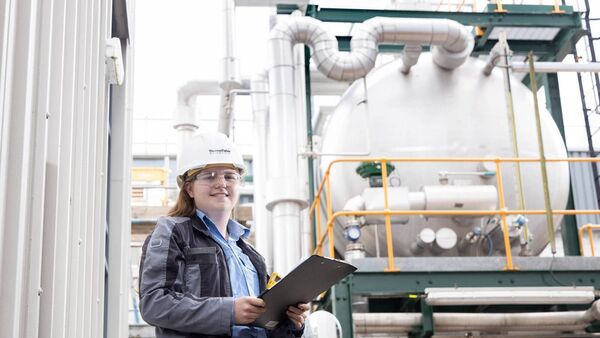Gender is gradually losing prominence among the factors guiding the career choices of young people in Ireland, says Eibhilín Hennessy, an apprentice with Thermo Fisher Scientific.
Dungarvan native Eibhilín, 24, joined Thermo Fisher Scientific in Currabinny, Co Cork, as an electrical and instrumentation apprentice in 2016. The company manufactures and supplies Active Pharmaceutical Ingredients (APIs) to customers for use in clinical trials and approved medicines for commercial supply.
This includes medicines to treat cancer, Parkinson’s disease, depression, HIV, congestive heart failure, diabetes and respiratory diseases, along with raw material for consumer healthcare products.
“My mother takes one of our medicines,” said Eibhilín. “It is very motivating for us to be part of a chain that helps improve people’s health. There’s a great mix of theoretical and practical to my role.
“I know everyone says this about their job, but you really do learn something different every day. The company also offers great opportunities for career progress.”
Eibhilín was speaking ahead of Science Week 2021, starting on Monday, November 8, which will seek to create a national conversation between the public, the STEM industry, the research community and the policymakers on the opportunities and challenges for science in Ireland.
Eibhilín says that a lot of work is currently being done to attract and support women into STEM roles. Many employers are playing a vital role in the bid to dispel gender myths around careers in science.
Eibhilín explained: “One myth is that men are naturally better at these types of jobs — in reality, nobody is born knowing how to do these jobs. Getting practical experience, as well as learning the theory, is how you improve and become the best craftsperson that you can be, regardless of gender.
“Another myth is that considering gender when hiring will discriminate against men or lead to unqualified women getting hired or promoted. The aim is to hire the best person for the job, male or female. It’s not about hiring women because of their gender but giving everyone fair opportunities based on their own ability and potential.”
Thermo Fisher Scientific is a contract development and manufacturing organisation (CDMO), with the Cork facility part of the company’s Pharma Services business.
In the past 20 months, the site in Cork has grown its team to 490 highly skilled people, including chemists, engineers, analysts and operators, along with acquiring new customers and scaling up production. That growth has been managed with gender at front of mind.
Eibhilín added: “Thermo Fisher Scientific has made sure that women have been able to access the opportunities created by its growth in the last few years. That starts with job adverts, which are constructed to appeal to a diverse audience, including software that screens them for inclusive language. Interview panels are gender-balanced, and our hiring managers are trained to recognise unconscious bias.
“Once people get hired, diversity and inclusion training is part of their onboarding. Our Women’s Employee Resource Group is also there to allow women themselves to be involved in the reshaping of Thermo Fisher Scientific’s corporate culture to be more gender-inclusive and allow women to support each other directly through mentorship and training.”
Much of Science Week is focused on young people. Eibhilín believes that programmes aimed at them can play a big role in eliminating gender stereotypes before they can crystalise.
She said: “Through Thermo Fisher Scientific’s school programmes, they try to give both girls and boys an experience of STEM and the options available to them later in life. Local primary schools are sent science kits that let them do practical experiments in the classroom, while the Transition Year programme gives students an insight of life at a pharmaceutical plant at a time when they are making important decisions about their college choices.”
Eibhilín is now nearing the end of her apprenticeship, where her on-the-job experience exposed her to different facets of the pharmaceutical industry, from research and development to water and electricity infrastructure. With her experience and qualification, she plans to pursue a career in industrial automation.
“There are so many opportunities following an apprenticeship and I would strongly encourage anyone to consider it as a career. The qualification is globally recognised and there are a huge variety of career prospects,” she said.










